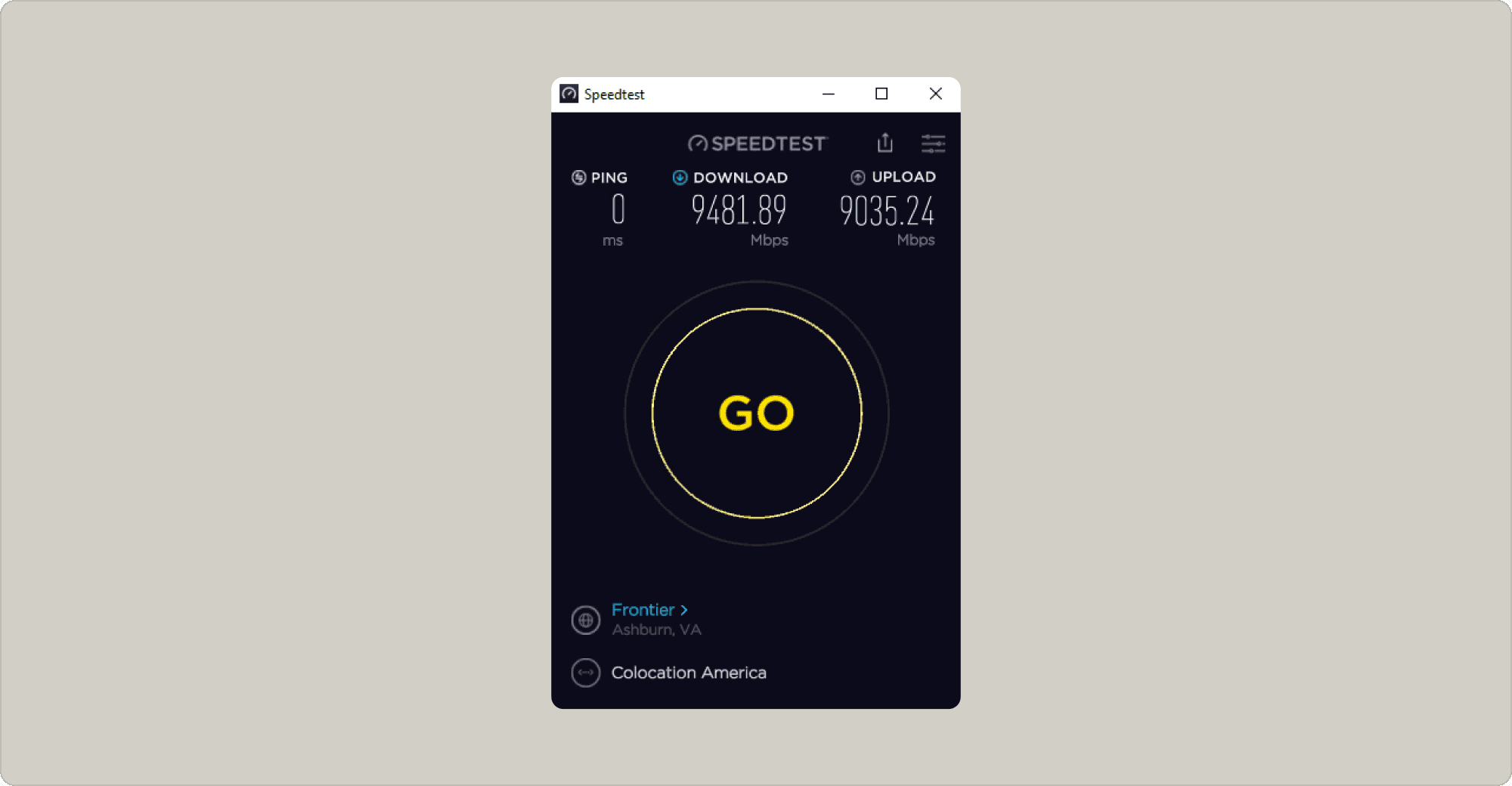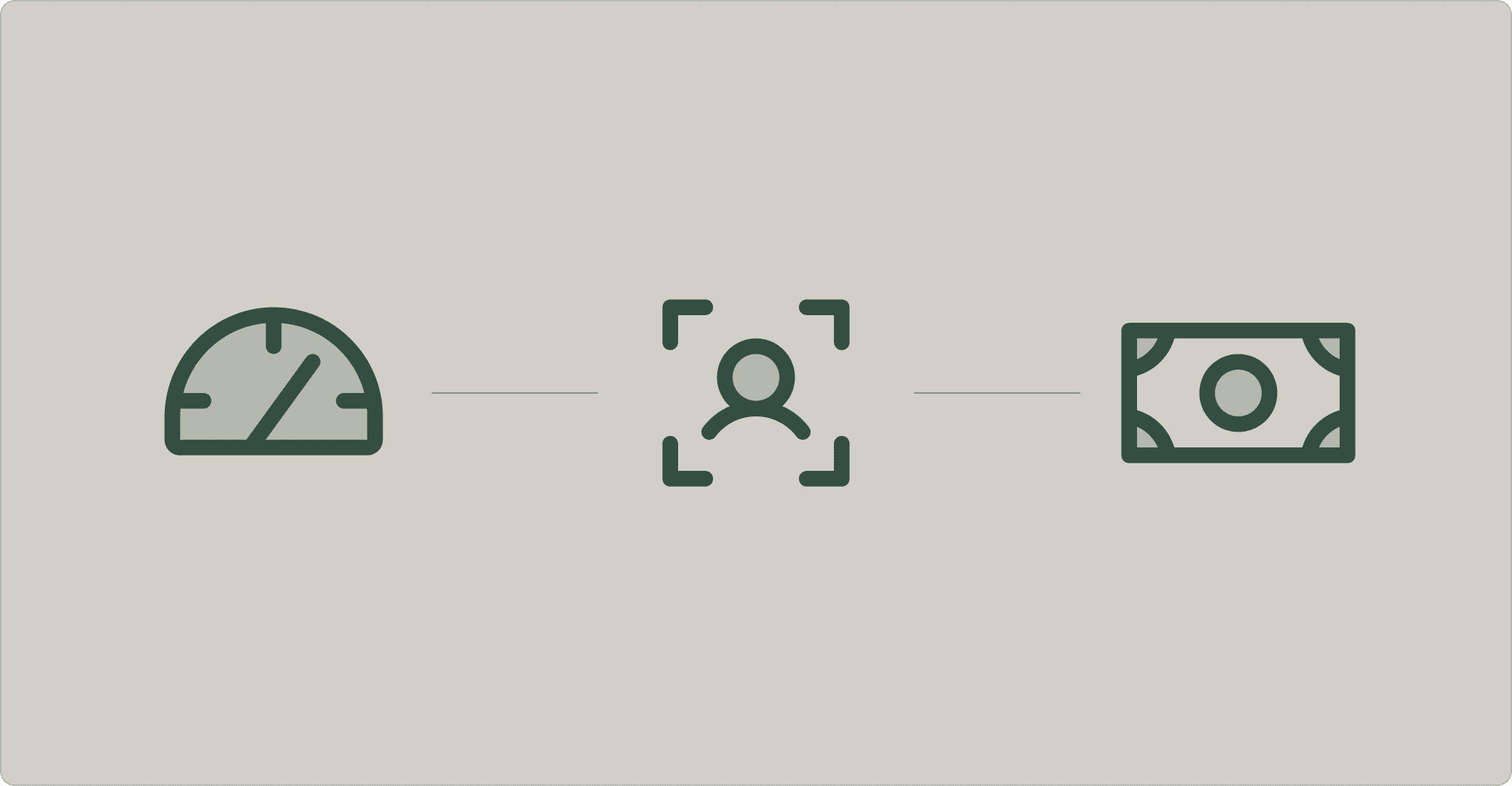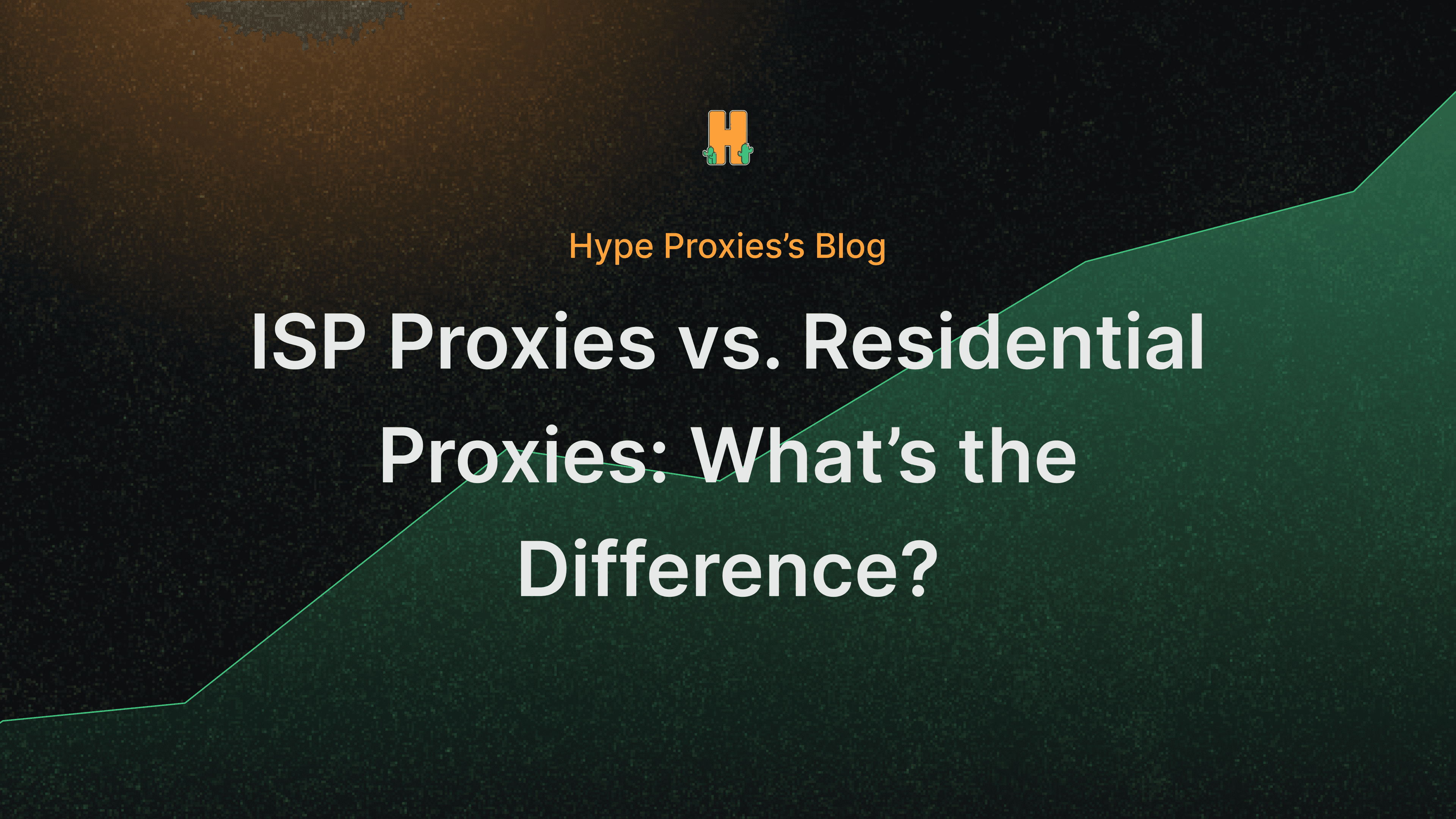ISP Proxies vs. Residential Proxies: What’s the Difference?
Discover the key differences between ISP proxies and residential proxies. Learn their pros, cons, and best use cases to choose the right proxy for your needs.

Hype Proxies
최근 업데이트 -
2024. 12. 20.
프록시
ISP and residential proxies are the two main types of proxies you can use. They both obscure your originating IP address - effectively providing more privacy and security - but work in slightly different ways.
ISP proxies are hosted in data centers and provided by Internet Service Providers. Residential proxies use IP addresses assigned to home internet users' devices. While ISP proxies offer speed and reliability, residential proxies provide higher anonymity.
In this article, we'll break down the main differences between the two types and (hopefully) provide you with some clarity on the topic.
Down for it? Let's get started!
What Are ISP Proxies?
ISP proxies, also known as static residential proxies, are proxy servers that use IP addresses provided by Internet Service Providers like Verizon, AT&T, Comcast, etc. An ISP proxy means the proxy IP address is coming straight from one of these internet providers.
But even though the IP address originates from an actual ISP, the proxy is actually hosted on a fast server in a data center. So you get the speed and reliability of a data center proxy, with the legitimacy and anonymity of an IP address associated with a true internet service provider.
When you use an ISP proxy, your internet requests get redirected through one of these IP addresses on the data center server instead of your actual IP address. The sites you visit will think the request is just coming from a regular home or business internet connection from that ISP.
Key Advantages of ISP Proxies
Blazing fast speeds: Because they're hosted in cutting-edge data centers designed for performance, ISP proxies are extremely quick - we're talking speeds up to 1 Gbps! You'll experience minimal lag or buffering even when accessing heavy content.
Great for data-hungry tasks: Because these proxies come directly from data centers, they can handle data-intensive jobs pretty well (much better than residential proxies, as we'll see). This can include large-scale web scraping, accessing APIs and databases with usage limits, streaming tons of video content, downloading files, etc.
With their supercharged data center internet connections, ISP proxies can handle data-intensive jobs without sweat. We're talking large-scale web scraping, accessing APIs and databases with usage limits, streaming tons of video content, downloading files - bring it on!
Reliable uptime: Data centers have backup power generators and internet links, so you can expect ISP proxies to have continuous up-and-running connectivity without interruptions or downtime. As long as your tasks don't get blocked by website security, ISP proxies provide reliable stability.
Key Disadvantages of ISP Proxies
Limited location targeting: The primary downside is that most ISP proxies only have IP addresses available in a handful of countries or regions. They lack more precise city-level targeting typically offered by residential proxies sourced globally from home internet connections.
Potentially raise flags on secured sites: Sophisticated websites may have advanced techniques to detect traffic from data centers, even if it's an IP address associated with a legitimate ISP. So, for sites with rigorous bot and proxy blocking, ISP proxies could be flagged and blocked faster than residential proxies.
Common Use Cases for ISP Proxies
Let's look at some of the most popular applications for ISP proxies:
Large-scale web scraping: If you plan on doing web scraping, ISP proxies should be your first choice. Thanks to their power (as they come from data centers), they can quickly crawl, parse, and extract huge volumes of data from public websites lacking advanced bot protections.
Streaming media content: Between fast speeds and unlimited bandwidth, ISP proxies make accessing overseas media streams and restricted video content effortless. Just sit back and binge-watch without annoying rebuffering or throttling!
Price monitoring and market research: Businesses rely on ISP proxies to continuously check competitor pricing, inventory levels, rating changes, and more across vast product catalogs. Their high-speed performance is extremely efficient at gathering market intelligence.
SEO analytics: ISP proxies provide a reliable infrastructure for continuously crawling and indexing websites to analyze rankings, backlinks, and other critical SEO metrics across a large domain portfolio.
Automated form submissions: ISP proxies make it easy to submit data at scale through online forms and web applications. Their speed and stability can power automated uploads, lead generation, and other form-based tasks.

What Are Residential Proxies?
Residential proxies are IP addresses provided by ISPs and assigned to real residential devices, making online activity appear as if it originates from a genuine household.
In other words, instead of hosting proxies on centralized servers, residential proxy providers distribute your internet traffic across many real home and mobile devices.
So when you use a residential proxy, your web requests get routed through real IP addresses assigned by internet service providers to everyday households and mobile users. This makes your activity blend in seamlessly with typical residential internet traffic.
Websites see thousands of home IPs every day. By mimicking this, residential proxies become almost impossible to distinguish from normal users, providing top-notch anonymity.
Key Advantages of Residential Proxies
Avoid detection with ease: Residential IPs perfectly emulate genuine user behavior, the gold standard for dodging bot checks and firewalls. Even sites with rigorous security get fooled into thinking residential proxy traffic is coming from just another household.
Constant IP rotation for flexibility: With abundant residential IPs available, providers can configure automatic rotation triggers. Every few requests or minutes, your traffic hops to an entirely new IP, making it even harder for sites to pinpoint your activity across sessions.
Key Disadvantages of Residential Proxies
Speed tradeoffs: Routing your connection through many residential devices leads to some latency and delays compared to data center proxies. While usually minor, expect occasional lag as traffic gets passed from home to home.
Potential reliability hiccups: If the residential IP you're temporarily using abruptly disconnects or goes offline, your connection gets interrupted until it is automatically rotated to a new IP. Annoying but manageable with a large enough proxy network.
Common Use Cases for Residential Proxies
What activities benefit from mimicking home internet users?
Social media marketing: Residential proxies facilitate managing multiple social media accounts and automating promotional posting across platforms without triggering spam locks.
Brand monitoring: Businesses rely on residential proxies to anonymously monitor discussion forums, review sites, social conversations, and more for candid consumer sentiment about products, initiatives, and emerging trends.
Media geo-dodging: Those restricted streaming sites with tight geo-blocks? Residential proxies nonchalantly bypass regional limitations to access overseas media content and distribute it to eager local audiences.
Competitive pricing research: Retailers leverage residential proxies to research competitor product catalogs discreetly, spot consumer price sensitivity signals, analyze bundling strategies, and infer promotional tactics without detection.
Secured website testing: Security professionals use residential proxies to safely probe websites, web apps and networks to uncover vulnerabilities without sending up red flags by using an obvious proxy IP.

Technical Differences Between ISP and Residential Proxies
Network Infrastructure
The core infrastructure enabling ISP and residential proxies works very differently under the hood.
ISP proxies are hosted in specialized data centers. As mentioned above, this results in optimal speed and reliability.
In contrast, residential proxies rely on regular home internet plans from providers like Comcast, Spectrum, Vodafone, etc. Instead of using data center resources, they route traffic through consumer devices like desktop PCs, laptops, tablets, and mobile phones connected to WiFi or cellular data plans.
This fundamental setup impacts performance and detection rates. Data centers offer much faster speeds and minimal downtime. However, funneling requests through thousands of residential devices allows residential proxies to perfectly emulate organic user behavior, which is crucial for avoiding blocks.
IP Address Origin
The source of IP addresses also differs significantly:
ISP proxies utilize IP addresses leased by internet service providers like Verizon, Deutsche Telekom, Rogers Communications, etc. Even though the proxies are hosted on data center servers, the IPs themselves come directly from legitimate ISPs.
Meanwhile, residential proxies derive their IP addresses directly from the internet providers of home users and mobile devices. The IPs are not provided by ISPs to data centers; they are sourced directly from the ISP internet plans regular households subscribe to.
So ISP proxies appear outwardly as normal ISP customers, while residential proxies actually harness the exact IPs assigned dynamically to customer devices. This grants residential proxies a much higher level of anonymity, making them near-impossible for sites to distinguish from regular visitors.
Differences Overview
Now that you have an idea of what ISP and residential proxies are and we also covered the technical differences, let’s talk about the “tangible” differences that you need to know to choose the best one for your use case.
Speed and Reliability
When it comes to speed and uptime, ISP proxies take the trophy. Hosted in cutting-edge data centers with top-notch connectivity, you'll enjoy lightning-fast speeds of up to 1000 Mbps. Performance and stability are maximized to minimize any hiccups or interruptions during use.
In contrast, residential proxies are slower and less consistent because they route through unpredictable home internet connections with variable speeds. While delays are usually minor, disconnections or failed requests can occasionally halt your activity until you get assigned a new IP.
Anonymity and Detection Risk
For anonymity, there is no contest; residential proxies win hands down. Their use of real user IPs means your activity gets lost in a sea of genuine internet traffic. Even sites with rigorous bot/proxy blocking will be utterly unable to distinguish you from an actual human visitor.
ISP proxies do provide decent anonymity by associating with legitimate ISPs but sophisticated fingerprinting can potentially identify traffic from a data center server rack. Residential proxies perfectly emulate organic user behavior, making detection virtually impossible.
Cost Considerations
ISP proxies are more expensive because you pay for the infrastructure and high-speed bandwidth of data center hosting. Large organizations may find the costs justified based on scalability. But for smaller users the price tag can be steep.
Residential proxies are very affordable, even when you spring for more advanced features like thousands of IP choices and intelligent rotation algorithms. The cost-saving value makes them attractive for individuals and smaller companies.

Summary
ISP and residential proxies have distinct advantages, making them suitable for different applications.
ISP proxies are hosted on a fast server in a data center, which means they offer lightning-fast speeds and maximum uptime (at a relatively high cost).
Residential proxies, on the other hand, route traffic through consumer devices like home PCs and mobile phones. This provides high anonymity at affordable rates, making it ideal for accessing sites secured against bots and automation.
Here's a simple decision guide:
ISP Proxies
Ideal for:
Large-scale web scraping
Accessing APIs/Databases
Media streaming
General geo-restriction bypass
Residential Proxies
Ideal for:
Social media automation
Secured/bot-protected websites
Precise geo-targeting needs
Market research/data collection
Evaluate your priorities—speed vs. anonymity? Geographic precision? Scale? Then, choose the proxy architecture that best meets your use case requirements!
(Pssst… don't tell anybody but we offer some of the best ISP proxies and residential proxies on the market, at a great price! Absolutely no pressure, but if you wanted to check them out, you would make our day :D)
Frequently Asked Questions
Can residential proxies be detected?
Residential proxies are highly unlikely to get detected when using a reputable provider. The only risk is if the proxy company doesn't vet their IP addresses properly or fails to provide enough diversity. As long as you rotate different residential IPs appropriately, websites shouldn't be able to flag your connection as a proxy.
Are ISP proxies suitable for all types of web scraping?
Not really. ISP proxies work very well for public web scraping of content not protected by anti-bot measures. However, for sites that actively block scrapers and bots, residential proxies stand a better chance of accessing the data without getting flagged. It depends on the level of security implemented by the target site.
Is it legal to use residential proxies?
Using residential proxies is completely legal as long as the proxy provider properly sources real user IP addresses through consent. Ethical providers pay regular internet subscribers to voluntarily route traffic through their devices via an installed app. As long as the proxy company respects data privacy laws, residential proxies pose no legal issues.
How do ISP and residential proxies handle IP rotation?
ISP proxies usually rotate IPs manually or through preset schedules. Since their pool is more limited, automated smart rotation is riskier for blocking subnets.
Residential proxies, on the other hand, have abundant IP resources, allowing advanced rotation based on custom rules like location, ISP, timeout thresholds, etc. This results in better randomness and reduced detection rates. Residential proxies also auto-rotate seamlessly if an IP goes offline.
공유하기
신용카드가 필요하지 않습니다. 지금 체험판을 시작하세요
20% 할인 찾기 중?
우리의 뉴스레터를 구독하여 독특한 할인 코드와 내부 프록시 테스터의 무료 사본을 받아보세요!
스팸 없음. 언제든지 구독 취소할 수 있습니다.





